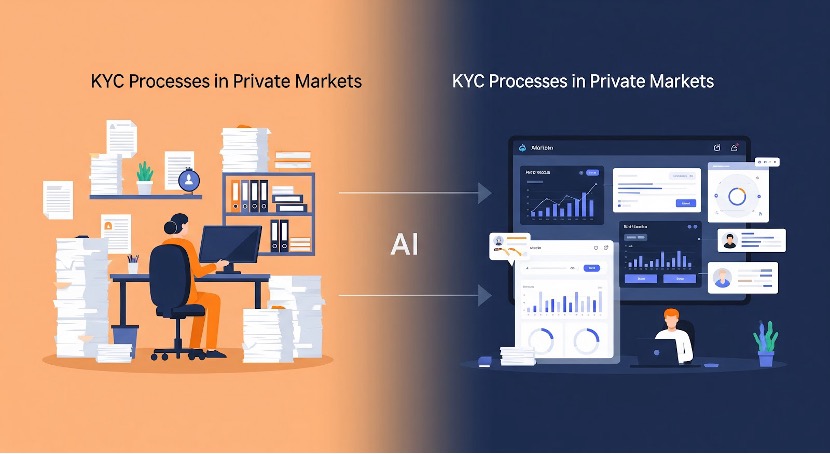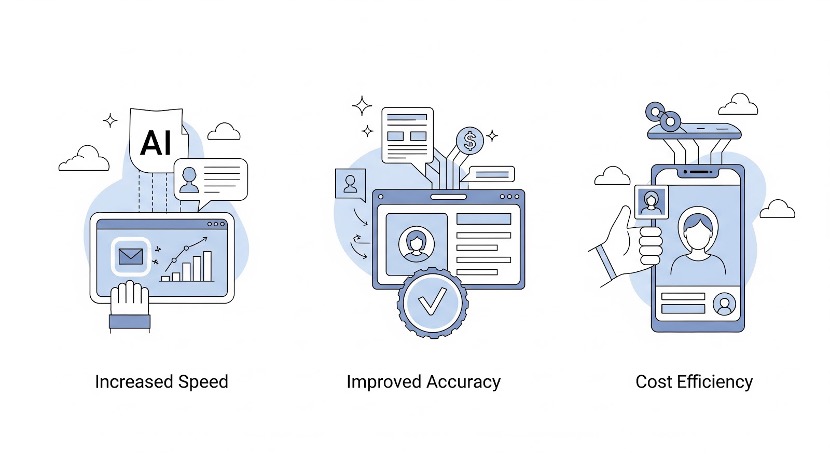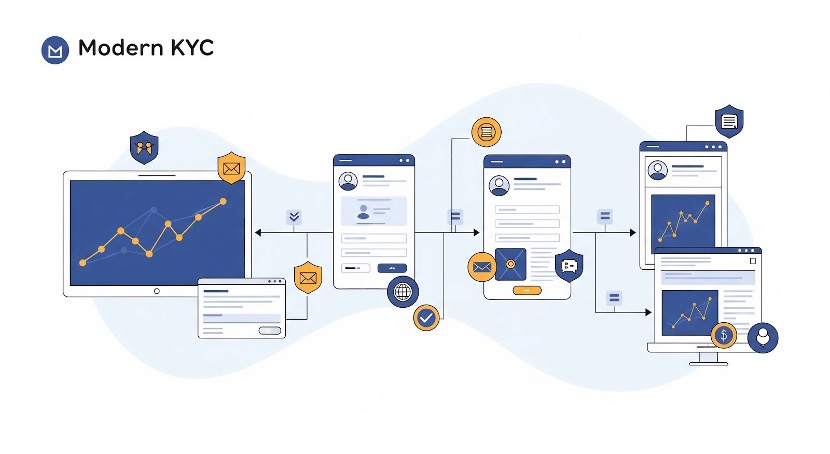What Is the Future of KYC Data Management?
Last Revised: September 8, 2025At a Glance
KYC in private markets is shifting from manual, paper-heavy workflows to AI-driven platforms that cut onboarding times, reduce compliance costs, and strengthen investor trust.
In today’s private investment market, outdated compliance procedures can cost firms investor trust and deal momentum. Manual document collection, endless PDFs, and email back-and-forth slow onboarding and create unnecessary regulatory risk.
But fear none: Intelligent automation and AI are transforming KYC from a manual burden into a streamlined, strategic function. For fund managers balancing investor expectations with tightening regulatory requirements, this evolution promises greater speed, accuracy, and confidence.
This blog post explores the current KYC data management landscape, the technologies reshaping it, and practical steps firms can take to prepare for the future.

KYC in private markets is shifting from manual, paper-heavy workflows to AI-driven platforms
What Does the Current Landscape of KYC Data Management Look Like?
KYC (Know Your Customer) remains the foundation of financial compliance. Yet for most private equity, venture capital, and hedge funds, the process is still fragmented and highly manual. In fact, a Kofax study found that onboarding high‑net‑worth investors still takes an average of 41 days.
Key challenges include:
- Fragmented workflows: Multiple systems, spreadsheets, and document versions create bottlenecks that slow onboarding.
- Data silos: Critical information is trapped across disconnected systems, complicating risk reviews and slowing approvals.
- Investor friction: Complex questionnaires and repeated document requests frustrate investors, undermining relationships before they begin.
This legacy approach is increasingly unsustainable. What firms need is a digital-first model that reduces manual effort, enhances transparency, and strengthens both compliance and investor experience.
How Are Automation and AI Driving Change?
Modern KYC platforms use automation and AI to streamline document handling, verification, and review. Instead of manual checks and fragmented email trails, compliance teams can rely on structured, end-to-end workflows.
The benefits are clear:
- Speed: According to a recent EY survey, AML and KYC together make up almost 20% of total investor onboarding time. Automated review compresses internal processing from weeks to hours, allowing faster investor approvals.
- Accuracy: AI-driven validation reduces human error and ensures consistent application of compliance standards.
- Cost efficiency: A recent Daizy report states that asset managers using automated compliance platforms achieved 30–40% lower compliance costs within a year. By minimizing manual intervention, firms lower operational costs and reduce the risk of regulatory findings.
For fund managers, faster and more accurate onboarding isn’t just a back-office upgrade — it’s a competitive differentiator in a market where responsiveness matters.

AI and automation benefits in KYC
What About Intelligent Data Extraction and Classification?
One of the most powerful advances in KYC technology is the ability to extract, interpret, and classify investor documents automatically.
Key capabilities include:
- Entity recognition: AI can distinguish complex investor structures — such as trusts, SPVs, and family offices — reducing manual sorting and review.
- Contextual analysis: Systems identify risk-relevant data points and highlight discrepancies for compliance teams.
- Real-time updates: Automated alerts flag expiring documents or new screening hits immediately.
With these capabilities, compliance teams move from static document review to dynamic risk monitoring — turning compliance into a proactive business function.
Enhancing Security and Reducing Compliance Risks
Security underpins every KYC process. Investors entrust firms with sensitive personal and corporate data, and any lapse carries reputational and regulatory consequences.
Modern KYC platforms embed security throughout the workflow with:
- End-to-end encryption: Ensuring data remains protected from collection through storage and sharing.
- Continuous monitoring: Real-time alerts highlight issues such as expiring IDs or unusual activity patterns.
- Third-party screening integration: Automated checks against sanctions, PEP, and adverse media databases keep firms audit-ready and regulator-aligned.
For managers, automation not only accelerates onboarding but also strengthens data governance and reduces compliance risk.

Modern KYC platforms embed security throughout the workflow
What Are the Future Trends in KYC Data Management?
Looking ahead, several innovations are set to further shape compliance operations:
- Biometric verification: Wider adoption of facial recognition and fingerprint authentication for investor identity checks.
- Predictive analytics: Using historical data to anticipate compliance risks before they emerge.
- User-centric design: Interfaces that are intuitive, transparent, and audit-friendly, meeting the needs of both investors and regulators.
- Unified compliance platforms: The market is shifting away from fragmented point solutions toward end-to-end platforms that cover KYC, AML, and Due Diligence in one place.
These trends will continue to shift KYC from a cost center into a source of operational strength and investor confidence.
How Can Firms Prepare for a Digital-First Compliance Future?
For private market firms, the move toward automated, AI-enabled KYC is no longer optional. Staying competitive requires action today. Practical steps include:
- Audit current processes: Identify bottlenecks and manual steps slowing down investor onboarding.
- Adopt scalable technology: Select platforms that automate today’s KYC requirements and scale with firm growth. Solutions like Blackbird provide AI-first automation tailored for private markets.
- Support team adoption: Ensure compliance and operations teams are equipped to embrace new tools through training and clear workflows.
- Prioritize security: Regularly review controls and ensure chosen platforms meet evolving data protection and AML standards.
By taking these steps, firms not only accelerate onboarding but also strengthen compliance resilience and investor trust.
The Bottom Line
The future of KYC data management is intelligent, automated, and secure. With AI-driven verification, real-time monitoring, and scalable workflows, firms can replace weeks of manual effort with efficient, audit-ready processes.
For fund managers, the impact is clear: faster onboarding, reduced compliance risk, and more time to focus on building investor relationships.
Why Blackbird?
Blackbird offers an AI-first solution tailored to private market firms — covering KYC, AML, and Due Diligence in one seamless platform. Our built-in automation means faster onboarding and compliance, without the added headcount.
Want to see it in action? Book a demo with our team.
For more insights (or fun KYC memes), follow us on LinkedIn.
About the Author
Linoy Doron is a Content Strategist at Blackbird, where she translates complex fintech and compliance topics into clear, actionable insights. With a strong background in technology, SaaS, and UX, she crafts narratives that connect product value to the real needs of asset managers in the private market.